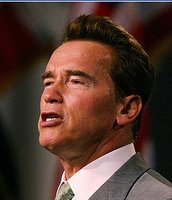CALIFORNIA: Gov. Directs State Agencies to Expand 'Bio-Fuels'
 California does not grow much corn. What it does have is biomass in other forms - corn stover, other crops, agricultural waste like rice straw, forestry waste, and urban waste including municipal solid waste (MSW) and sewage. So the focus for ethanol production in California - which imports 95% of the ethanol it blends into its gasoline - has NOT been on corn fermentation but on biomass conversion, the key subject of this blog. Conversion technologies (CTs) can turn biomass into clean electricity, heat, and ethanol with virtually zero toxic emissions. Developing these technologies could be the solution to the world's fossil fuel dependence and a boon to California's economy.
California does not grow much corn. What it does have is biomass in other forms - corn stover, other crops, agricultural waste like rice straw, forestry waste, and urban waste including municipal solid waste (MSW) and sewage. So the focus for ethanol production in California - which imports 95% of the ethanol it blends into its gasoline - has NOT been on corn fermentation but on biomass conversion, the key subject of this blog. Conversion technologies (CTs) can turn biomass into clean electricity, heat, and ethanol with virtually zero toxic emissions. Developing these technologies could be the solution to the world's fossil fuel dependence and a boon to California's economy.
Governor Schwarzenegger gets it. Witness his executive order April 25th in response to the relentless price hikes on gasoline in the state and his environmental commitment to reduce pollution and greenhouse gases.
-------------------
Gov. Schwarzenegger Directs State Agencies to Expand 'Bio-Fuels' to Fight High Gas Prices
In line with his strong leadership in reducing California's dependence on petroleum fuels, Governor Schwarzenegger today directed several state agencies to take major steps toward the widespread use of renewable energy sources known as bio-fuels. Biofuels, such as ethanol, can be developed from specially grown crops such as corn and sugar, to produce clean, renewable transportation fuels or electricity. Fuels can also be developed from naturally occurring waste, such as rice straw, animal waste and municipal solid waste.
"It is critical that we do everything we can to reduce our dependence on petroleum-based fuels," said Gov. Schwarzenegger. "Turning waste products into energy is good for the state's economy, local job creation and our environment. By implementing biomass programs in California, we will help fight critical waste disposal and environmental problems, including the risk of wild fires, air pollution from open field burning, and greenhouse gas emissions from landfills."
The Governor issued Executive Order S-06-06 establishing targets for the use and production of biomass products such as biofuels (liquid) and biogas (gas) as an integral part of California's renewable portfolio standard. To achieve these targets, he directed the California Energy Commission (CEC), the Resources Agency and other state agencies to collaborate, research, promote and identify funding to advance biomass programs in California. The CEC will report the progress to the Governor's Office and Legislature on a biannual basis.
California will produce a minimum of twenty percent of its own biofuels by 2010 and forty percent by 2020, according to targets set by the executive order. Currently, of the 900 million gallons of ethanol consumed in California (which is 25 percent of the entire nation's consumption), only five percent is produced in California.
The executive order also calls for the use of biomass for electricity to reach 20 percent within the state's Renewables Portfolio Standard (RPS) goals for 2010 and 2020.
Under Gov. Schwarzenegger's leadership, California has continued to champion policies that reduce the state's dependence on petroleum. To promote the transition to alternative fuels, the Governor led the effort to create the hydrogen highway which will provide Californians with 200 hydrogen fueling stations across the state.
technorati bioenergy, greenhouse, California, legislation, ethanol, Schwarzenegger, pollution


No comments:
Post a Comment